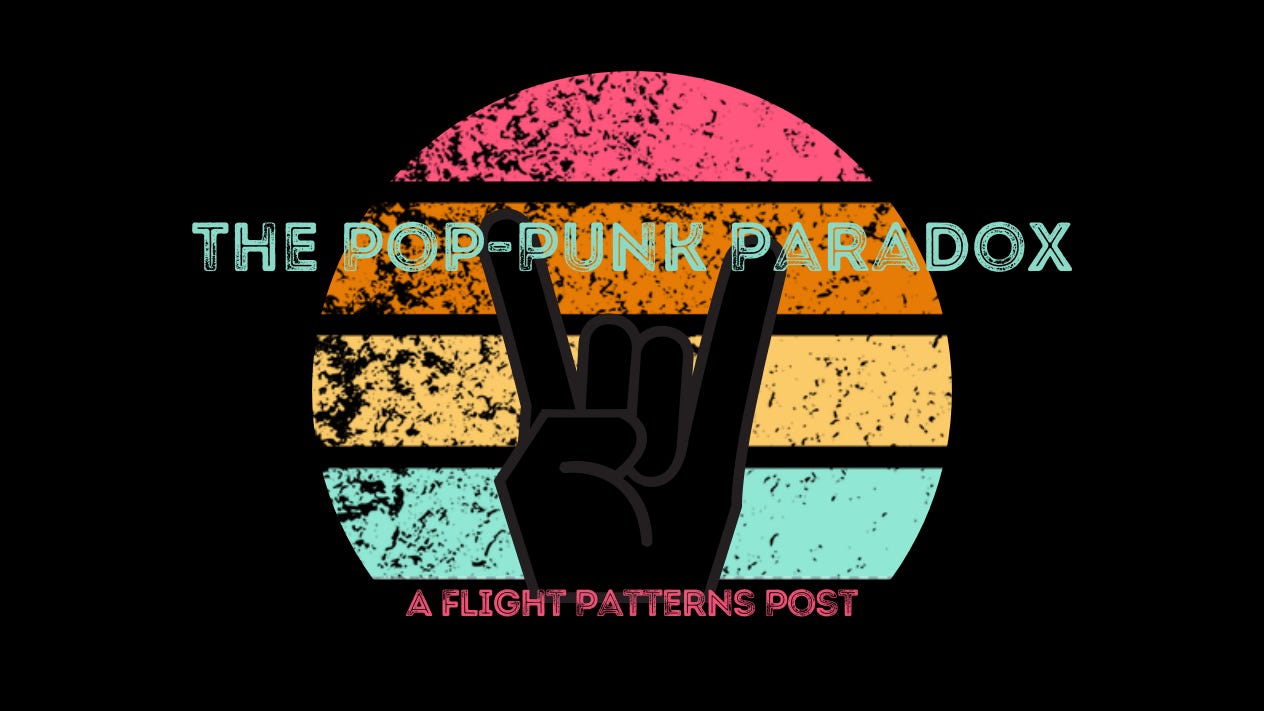Pop-punk is a polarizing musical oddity whose very existence is an oxymoron. This genre takes the edgy, rebellious, offputting messages of punk and combines them with the catchy melodies, fascinating wordplay, and accessible nature of pop music. The fanbase is incredibly niche, however, the haters are myriad. Punk purists think pop-punk is too watered down, while pop enthusiasts think it’s too aggressive.
Detractors of pop-punk call it “too soft, too fake, too derivative, and too corporate,” to be considered punk, according to popmatters.com.
Pop-punk has jangling, beachy electric guitars in place of the distorted power chords of punk, although there is overlap between the genres. Punk is famous for screamed or snarled lyrics, where pop punk includes harmonies, gang vocals, vocal doubles and lots of reverb, tending to be more effeminate and/or nasally.
Many makers of pop-punk face opposition from others and self-doubt for making such in-between music. In the anthem “Figure Me Out” by The Summer Set, Brian Logan Dales sings, “I'm a bit too pop for the punk kids/ But I'm too punk for the pop kids/ I don't know just where I fit in…” Later lyrics reference Bruce Springsteen as an influence, a common influence for pop-punk bands of the ‘00 era.
Eleventyseven’s Matt Langston bemoans, “never made it in the punk rock crowd, I / beep-booped just a little too loud,” in his song, “Cookie.” He wryly observes that “Green Day sold a whole lotta Dookie.” Punk band Green Day’s album Dookie was looked down in some circles because the band was moving from grunge to more melodic music (and switching labels to boot.)
In eleventyseven’s song “Wish Myself Away,” he also sings “wish I was a little more punk than pop / a little less cotton candy rock” expressing how difficult it is to live in this niche realm in between two established and more respected genres.
The subject of growing up is a major issue in both punk and pop-punk, however, punk artists are less likely to grow up. They have a nihilistic view of life in general, and don’t have any faith in life past adolescence. Pop-punk artists are more okay with growing up but remember fondly their childhood and teenage years.
“Punk is so tied up with the disillusions of growing up that punks do often age poorly,” wrote Robert Christgau on And It Don’t Stop.
In contrast, Light The Way has a much more positive point of view on growing up when they sing, “I feel stuck in that part of life/ where I'm not old/ but I'm not a kid anymore/ and honestly the more I think, I think I love it.”
There are many common threads among pop-punk bands including similar sounds, production methods and lyrical themes, leading to accusations of “it all sounding the same,” “being too derivative,” and “sounding like Disney music.” However, to some extent, music within a genre will, by the very definition of “being in the same genre,” have similarities. Fans of pop-punk like it because it sounds a certain way, it triggers nostalgia. Derogatory claims of it being Disney music demonstrate ignorance; Disney was pulling from popular bands and sounds of the time, which just happened to be pop-punk.
At the same time, there is a surprising amount of variation in pop-punk. Pop-punk artists incorporate everything from synths, strings, kazoos, tambourines, and even toy pianos into their music. Matthew Thiessen of Reliant K experimented with a cappella music. Grandpa Loves Rhinos alternates between playful pop-punk breakdowns and emotionally vulnerable screamed bridges. Paradise Fears incorporates rap and spoken word interludes. Yellowcard benefits from the talent of violinist and fiddler Sean Mackin.
The understated appeal of pop-punk is that it appeals to the true outcasts, the kids on the edge, the ones in between popular and punk. Life is full of dichotomy, and many people relate to being oxymorons, not fitting in with the popular kids but not being complete anarchists either. For lovers of pop-punk it represents being comfortable with both sides of oneself, not needing to be offputting and aggressive yet not needing to think just like everyone else.
So ultimately, while pop punk is guilty as charged of being softer and “betraying so many punk principles that it is undeserving of being recognized as punk,” this is not a reason to hate on the genre. Because the spirit of punk is to be okay with yourself, not what anybody tells you to be. For punk artists to diss pop-punk artists for not being tough or authentic or shoving safety pins through their noses is hypocritical. In trying to escape from rules and authority, punk artists unintentionally set up a new hierarchy.
There is great irony in insisting music should follow rules. There is even greater irony in insisting punk music should follow rules…
“Something that was based on not having any rules has probably been one of the strictest ******* rule books in the world,” said Dave Baksh, Sum 41’s guitarist. If the entire point of punk is to be released from unnecessary rules, then I’d say pop-punk did a pretty good job – creating music in spite of what other people thought of it.



